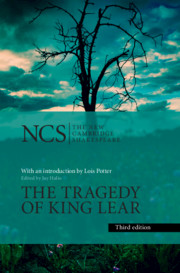
- Cited by 4
-
Cited byCrossref Citations
This Book has been cited by the following publications. This list is generated based on data provided by Crossref.
Gourg, Claude 2008. The “Bundle” in Edward Bond’s Plays, an Avatar of the Unspeakable “Thing”. Études britanniques contemporaines,
March, Florence 2021. Shakespeare en prison : le cas d’Avignon. Sillages critiques,
Wu, Haotian 2025. Dwelling in the Abyss: Society in Werner Herzog and Martin Heidegger. Film-Philosophy, Vol. 29, Issue. 1, p. 144.
Seymour, Laura 2025. Shakespeare and Neurodiversity.
- Publisher:
- Cambridge University Press
- Online publication date:
- January 2021
- Print publication year:
- 2020
- Online ISBN:
- 9781108164412
- Subjects:
- Literature, Literary Texts
- Series:
- The New Cambridge Shakespeare


